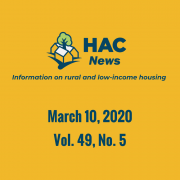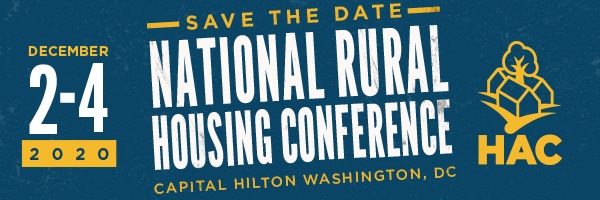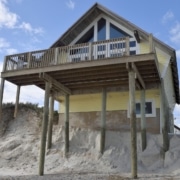News Formats. pdf
November 20, 2019
Vol. 48, No. 25
Agreement reached on FY20 government funding • Regulators release Community Reinvestment Act proposal • Fair housing funds available from HUD • Funding offered for housing aid to victims of human trafficking • African American Cultural Heritage grants available • HAC seeks Senior Portfolio Manager • Final Opportunity Zones regulations posted • House passes farmworker and rental preservation bill • GAO review of ERS/NIFA relocation requested • Employees’ morale holds steady at USDA RD, plummets at ERS and NIFA • USDA RD launches new website • Applications invited for Rural Youth Summit scheduled in April 2020 • Low Income Housing Tax Credits and Affordable Rentals in Indian Country • Why Millennials are Moving Away from Large Urban Centers • Happy Holidays! SAVE THE DATE FOR HAC’S 2020 RURAL HOUSING CONFERENCE! • HAC offers Section 512 packaging training for nonprofits, March 10-12 in Virginia • Need capital for your affordable housing project?
HAC News Formats. pdf
December 20, 2019
Vol. 48, No. 25
Agreement reached on FY20 government funding.
Two lengthy spending bills to fund the entire federal government for the rest of fiscal year 2020 were passed by the House on December 17 and the Senate on December 19. President Trump is expected to sign them into law before the most recent continuing resolution expires on December 20. H.R. 1865, which includes both USDA and HUD, keeps most USDA rural housing programs at FY19 levels. It increases funding for preserving rural rental housing and includes other pro-preservation provisions as well. It also contains a provision inserted on the Senate floor that allows USDA to renew Section 521 Rental Assistance agreements for 20 years, when requested by property owners, and subject to annual appropriations. Many HUD programs, including HOME and CDBG, receive funding increases in the final measure. It also directs more than $1 billion in Low Income Housing Tax Credits to fire-damaged parts of California and pressures HUD to release disaster funding for Puerto Rico. H.R. 1158, the second of the two final bills, includes the full funding needed to undertake the 2020 Census. It also renews the National Flood Insurance Program.
Regulators release Community Reinvestment Act proposal.
A long-awaited proposal to revise Community Reinvestment Act regulations has been announced by the Federal Deposit Insurance Corporation and the Office of the Comptroller of the Currency. The changes are intended to quantify the CRA scoring system that rates banks’ service to their communities, and to broaden their responsibilities to include locations where they receive deposits, rather than only where their branches are located. Public comments will be due in mid-February, 60 days after the proposal is officially published in the Federal Register.
Fair housing funds available from HUD.
HUD is offering funds from three components of the Fair Housing Initiative Program. The application deadline for all three programs is February 6.
- The Education and Outreach Initiative will fund fair housing organizations, nonprofits, state or local governments and Fair Housing Assistance Program agencies to conduct education and outreach informing people of their fair housing rights and responsibilities.
- The Private Enforcement Initiative will fund experienced Qualified Fair Housing Enforcement Organizations and Fair Housing Enforcement Organizations to take complaints, conduct investigations, offer education and other activities.
- The Fair Housing Organization Initiative will fund nonprofits or fair housing groups to build the capacity of other organizations to undertake fair housing enforcement activities.
Funding offered for housing aid to victims of human trafficking.
Nonprofits, tribes, units of local government, and states and territories are eligible for grants to provide transitional or short-term housing assistance and support services to victims of human trafficking. The deadline is February 3. For more information, contact the National Criminal Justice Reference Service, 800-851-3420, grants@ncjrs.gov. (This funding announcement, released by the Department of Justice’s Office for Victims of Crime, replaces one that was announced by HUD earlier in 2019, then postponed.)
African American Cultural Heritage grants available.
The National Trust for Historic Preservation will make grants to public agencies and nonprofits for planning, capital projects and capacity building that will advance ongoing preservation activities for historic places representing African American heritage. Letters of intent are due January 15. For more information, contact the Trust, grants@savingplaces.org.
HAC seeks Senior Portfolio Manager.
The Senior Portfolio Manager provides leadership and oversight to a team that performs a range of lending activities – closing, disbursement, monitoring, servicing and asset management of single-family and multifamily housing development loans – in HAC’s Loan Fund Division, based in Washington, DC. Email a resume and brief cover letter to jobs@ruralhome.org with “Senior Portfolio Manager” in the subject line. Applications will be considered as received.
Final Opportunity Zones regulations posted.
A final rule governing the Opportunity Zones program was issued December 19 by the Treasury Department and IRS. It will take effect 60 days after it is published in the Federal Register.
House passes farmworker and rental preservation bill.
On December 11 the full House approved the Farm Workforce Modernization Act (H.R. 5038), which includes provisions relating to farmworkers and rural rental housing preservation. It is not clear whether the Senate will take any action on the measure.
GAO review of ERS/NIFA relocation requested.
Five Democratic members of the House Science, Space and Technology Committee have asked the Government Accountability Office to review the Administration’s decision to move the Economic Research Service and the National Institute of Food and Agriculture to Kansas City. As the letter to GAO notes, hundreds of employees declined to move, and USDA’s latest figures show 64% of ERS positions and 75% of NIFA positions are empty. The House appropriations bill for FY20 would have blocked the relocation but, since the shift has now been completed, this week’s final funding bill does not.
Employees’ morale holds steady at USDA RD, plummets at ERS and NIFA.
The annual “Best Places to Work Agency Ratings,” based on surveys of federal workers, show Rural Development is number 364 among 420 sub-agencies, scoring 52.7 out of 100, essentially the same as its 52.8 score in 2018. After the Administration relocated their offices, the Economic Research Service’s score fell 30 points from 2018 to 2019, putting it at number 415, and the National Institute of Food and Agriculture dropped 24 points to number 419. RD’s highest score since 2013 – the earliest year shown with this year’s data – was 67.7 in 2017, when ERS scored 74.6 and NIFA 53.4.
USDA RD launches new website.
The new version of rd.usda.gov reorganizes the former “Regulations and Guidelines” section into a “Resources” category. Resources are divided between “Regulations” and “Directives,” with the latter category including Administrative Notices, Unnumbered Letters, Handbooks and more. Some URLs have changed and some remain the same.
Applications invited for Rural Youth Summit scheduled in April 2020.
The Rural Assembly will select 50 people aged 16-24 from rural communities and Native Nations to attend the Rural Youth Summit, to be held April 2-5 in McAllen, TX. The summit’s goals are “to further explore the unique challenges facing rural youth, identify creative solutions, and provide a context for how these issues fit into national rural policy.” Local organizations and schools can serve as sponsoring organizations. Applications are due January 31. For more information, contact Mary Sketch, 919-402-7241.
Recent publications and media of interest
- Low Income Housing Tax Credits and Affordable Rentals in Indian Country discusses “how the complex relationship between economic incentives and policy objectives creates a unique challenge for LIHTC development in tribal areas.”
Happy holidays!
|
SAVE THE DATE FOR HAC’S 2020 RURAL HOUSING CONFERENCE!
The conference will be held in Washington, DC on December 2-4, 2020 with pre-conference meetings on December 1. The HAC News will announce more details, including registration, as they become available.
|
HAC’s board and staff wish peace, happiness and affordable housing to all!
HAC offers Section 502 packaging training for nonprofits, March 10-12 in Virginia.
This three-day advanced course trains experienced participants to assist potential borrowers and work with RD staff, other nonprofits and regional intermediaries to deliver successful Section 502 loan packages. The training will be held in Glen Allen, VA on March 10-12. For more information, contact HAC staff, 404-892-4824.
Need capital for your affordable housing project?
HAC’s loan funds provide low interest rate loans to support single- and multifamily affordable housing projects for low-income rural residents throughout the U.S. and territories. Capital is available for all types of affordable and mixed-income housing projects, including preservation, farmworker, senior and veteran housing. HAC loan funds can be used for pre-development, site acquisition, site development and construction/rehabilitation. Contact HAC’s loan fund staff at hacloanfund@ruralhome.org, 202-842-8600.
Please note: HAC is not able to offer loans to individuals or families. Borrowers must be nonprofit or for-profit organizations or government entities (including tribes).

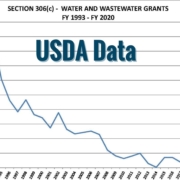 Housing Assistance Council
Housing Assistance Council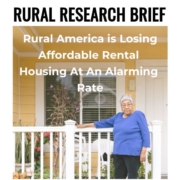 Housing Assistance Council
Housing Assistance Council
